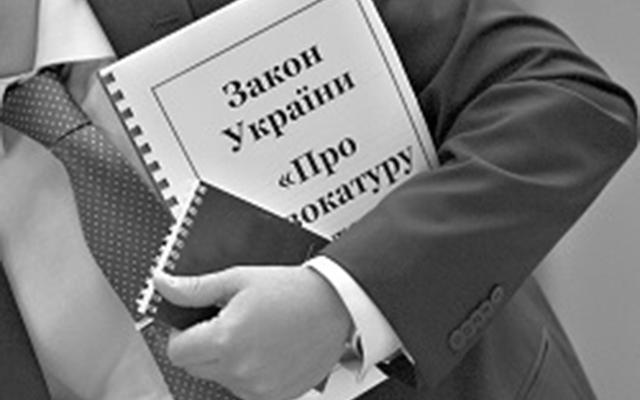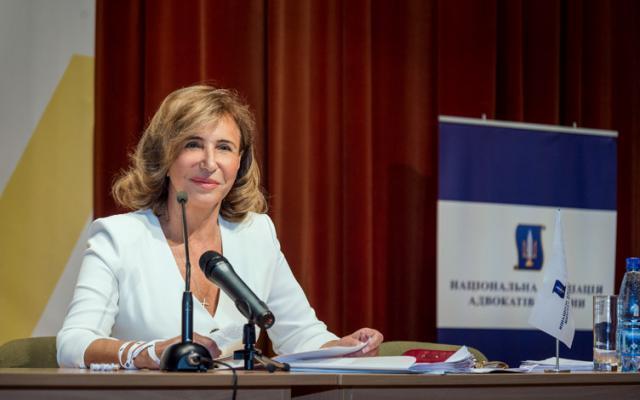
Home quote
An attempt to bring the reform of legal profession into the shadows can lead to a distortion of the essence of this legal institution and a negation of the advocate’s role.
Publications
Another day, another shade
In early October the Bar reform returned to the political and professional agenda. By sheer chance this process, invested with mystery, became public for the first time since last December. Let me remind you: at that time the working group, under the auspices of the Judicial Reform Council, approved the draft amendments to the Law “On the Bar and Practice of Law” without the knowledge of the official representative of the profession, without taking into account its proposals and without its subsequent acquaintance with the draft amendments. After this demonstrative gesture to the entire Bar community nothing new happened to this secret document. And only at the beginning of October this year, after the dialogue was initiated by the Council of Europe office in Ukraine, the Ukrainian National Bar Association (UNBA) learned that the draft law has gained impetus for further movement. Now it is submitted to the Council of Europe international experts for assessment of its compliance with the minimum European standards. At the same time, even after the involvement of European partners, the message of the working group remains unchanged – ‘the admission of the Bar to the final text is not authorized’. Whatever wild it may sound. Revealingly, the European experts also refused to provide us with a text they suggested to discuss at a meeting with the UNBA. Shall we understand it in such a way that European experts similarly demonstrate their agreement with the approach when the reform of the legal profession is conducted without the knowledge of a single professional organization? The Council of Bars and Law Societies of Europe (CCBE) is outraged by this position.
Reforming the Bar with the participation of the Bar is an international standard of practice. We, the UNBA, as an official representative of the profession, expected that it would be respected. This is the first and key condition for a truly European reform in Ukraine. However, it is not maintained not only at the stage of development of the amendments to the draft law, but also at the stage of adoption of such decisions as those related to the determining of the amount of advocates’ contributions at the legislative level. Such practice is phenomenal and exists in one or two European countries only. In Ukraine it was introduced with the only purpose – to weaken the financial independence of the Bar self-government, since it works exclusively at the expense of the advocates’ contributions. Together with the additional tax burden on advocates as the entrepreneurs, this goal is achieved even more effectively.
It is obvious that there is a completely different process, as a result of which the reform of the Bar institute becomes the shadiest segment of the judicial reform. An important remark: the draft law announced by the Working group has an unclear status due to the fact that the Working group itself has no public mandate and has no direct influence on the decisions of the Judicial Reform Council. Perhaps this group is not one and only, and there is parallel work underway to amend the Law on the Bar. As a result, the Judicial Reform Council will adopt the decision that it thinks fit, giving no consideration whatsoever for the work of any working group or expert team. These suspicions are not unreasonable. This is a realistic scenario for discrediting all the successes achieved in the large-scale judicial reform process, not to mention the very reform of the constitutional institute for protection of citizens’ rights, launched under the same algorithm.
The professional community does not intend to put up with such behind-the-scenes approach. We are left with a little option. The common position has already been clearly stated in fairly radical decisions of the regional bar councils, and in the rigid Resolution of the Bar Council of Ukraine dated October 14, when the meeting was urgently convened in response to a new attempt to silence the voice of the Bar.
After meeting with the Council of Europe international experts the UNBA appealed to the President of Ukraine calling to prevent the backroom foul play with the Bar institute. After all, its players expect that the Head of our state will not delve into the details of the process of development of the final draft law. And the devil lies in such details. The situation, when the whole process takes place behind the back of the Bar, is absolutely unacceptable and is unequivocally regarded as a threat to the independence of legal profession.
In its open appeal to the President the UNBA called to ensure transparent work on the draft law. The UNBA, as an authorized representative of the Bar, shall fully participate in the discussion and elaboration of the draft law. This role has not yet been entrusted with us. Now we need to return to professional work on text and stop multiplying versions and rumors. It is not necessary to hurryingly conduct demonstrative pro forma events in regions. Upon agreeing a single text it will be necessary to hold public hearings of broad formats, such as an open meeting of the working group under the Judicial Reform Council. The fact that the text should be made public is fundamental. Moreover, the draft law, which was handed over to the Council of Europe experts for assessment of its compliance with the minimum European standards, shall undergo a comprehensive evaluation by the Venice Commission. This is a consensus practice of evaluation of the reforming draft law, and it will give an opportunity to obtain an objective conclusion about its compliance with European standards and the advisability of the proposed amendments to the Law “On the Bar and Practice of Law”. After all, the current Law fully reflects the position of the Venice Commission (relevant Conclusion was provided in 2011), and the expert conclusions of the Council of Europe reform projects have not previously confirmed the need for detailing its provisions as related to the bar self-government. With the adoption of the Law “On the Bar and Practice of Law” in 2012 Ukraine fulfilled one of the conditions for signing the EU-Ukraine Association Agreement. In addition, the Law was consistent with the PACE Recommendations on the establishment of a single professional bar association. With the adoption of the current law the Ukrainian Bar was reformatted into a self-governing European-model institution, endowed with a full range of powers and independent of the state, both financially and organizationally.
Knowing the prehistory of the development and adoption of the Law of 2012, it becomes clear that the request of the supporters of the secret draft law for its assessment for compliance with the minimum CE standards is nothing more than an easy way to agree the document with the European partners. The way, which is bypassing the uncomfortable questions about the true aims of the proposed version of the reform and the democratic nature of its development. If we are talking about a package of progressive amendments to the law, why shall they hide it from advocates and submit for international expertise with a very limited mandate? The lack of publicity and the cautious request for a partial analysis of the draft law outside the context of the real situation in the Bar, as well as without assessing the effectiveness of the work of the bar self-government are the main arguments indicating that the reform is not being implemented. The whole Ukrainian society is presented with an attempt to put the Bar in political dependence. The fact that some public supporters of the draft law (in its December version) are now trying to distance themselves in the same way, promise further elaboration, deny the fact of their own involvement and even awareness of its content, speaks of the very questionable nature of the process. However, not in the eyes of its pragmatic ideologists, but in future assessments by European partners.
Can this intrigue behind the back of the Bar correspond to the title “Reform meeting European standards”, even by the minimum criteria, even by the form? The answer to this question is provided by international legislation on legal profession. The independence and self-governance of the legal profession are recognized by the Council of Europe Recommendations of October 25, 2000, and the UN Basic Principles on the Role of Lawyers of December 14, 1990. Moreover, the CCBE key documents, such as the Charter of the Core Principles of the European Legal Profession and the Code of Conduct for European Lawyers, recognize the independence of legal profession and its self-governance as key values. Based on the provisions of these documents, on December 23, 2016 the CCBE appealed to the leadership of Ukraine calling to refrain from any changes in the specialized legislation without consulting the Ukrainian National Bar Association. The CCBE intervention letter was a reaction to the shadow approval of the draft law on Bar reform on December 15 last year in the absence of UNBA representatives. Today’s events demonstrate how the authors of the reform defer to the opinion of the European professional community and respect Ukraine’s international obligations as a member of the Council of Europe and the United Nations.
The text secrecy generates many groundless accusations against the UNBA. There is a public discreditation of both the bar self-government and the UNBA proposals submitted by its members to the working group (although our consolidated proposals submitted in March 2016 were published). For a while they really gave the appearance of our involvement in the process, though, rather in the status of those welcomed in the working group than in the status of the Bar reform participants. By December 2016 we were deprived of this possibility, and the final version of draft law does not reflect the proposals of the Bar. It should be recalled that the Bar has very responsibly approached the implementation of the 2014 coalition agreement and has approved the relevant draft amendments to the specialized law at the Extraordinary Congress of Advocates. The document adequately responded to the real threats to the independence of legal profession, was submitted to the Ministry of Justice and then to the Judicial Reform Council. All proposals of the UNBA representatives in the working group, all consolidated proposals to the interim version of the draft law in March last year, the original draft amendments to the Law were submitted openly, publicly and reasonably. All speculations regarding the UNBA proposals, supposedly aimed at restricting the advocates’ rights and narrowing the democracy in the system of bar self-government, were nothing more than a mirror image of the intentions of our opponents.
Someone’s plans to liquidate the self-governing institute of the Bar fall within the logic of removing the official representative of the Bar from the process, but they do not agree with the goals of the strategic documents on judicial reform and the international documents mentioned above. The Presidential Decree “On the Strategy for Reforming the Judiciary, Justice and Related Legal Institutions for 2015-2020” unequivocally defines one of the objectives of the reform as “strengthening at the institutional level of the Ukrainian National Bar Association to ensure proper professional activities of the Bar, management of legal professions and representation of collective interests of all advocates”. This wording is provided for in the paragraph “Strengthening the guarantees of the practice of law, ensuring the availability of legal aid”. This is the ideology of reform we can agree with. However, its implementation has so far gone in the opposite direction, and this causes natural resistance. The Bar is ready not only for a public discussion of the future place of the legal profession in the system of justice, its authority in the eyes of society and its meaning for every citizen. We will do our best to stop all attempts to move away from Ukraine’s international obligations to the Council of Europe, to bring chaos into the work of the Bar self-government and to eventually return the Bar under control of the state.
Article “Another day, another shade” by Lidiia Izovitova is published in the Yurydychna Praktyka Newspaper

Lidiia Izovitova
President of the Ukrainian National Bar Association and the Bar Council of Ukraine
Other publications author
Publications

Censor.net Protecting advocates – protecting justice: addressing concerns about the new law

Ihor Kolesnykov A BRIEF SUMMARY REGARDING THE APPLICATION OF THE ORDER ON EXTENDED CONFISCATION IN LATVIA REGARDING FINANCIAL ASSETS OF…

Valentyn Gvozdiy WORKING IN A WAR ZONE

Lydia Izovitova Formula of perfection

Sergiy Vylkov Our judicial system is so built that courts do not trust advocates

Iryna Vasylyk Advocacy in the proclamation of Independence of Ukraine

Oleksandr DULSKY When we cross the border of the Supreme Anti-Corruption Court, we get into another department of the National Anti-Corruption…

Vadym Krasnyk The UNBA will work, and all obstacles and restrictions are only temporary inconveniences

